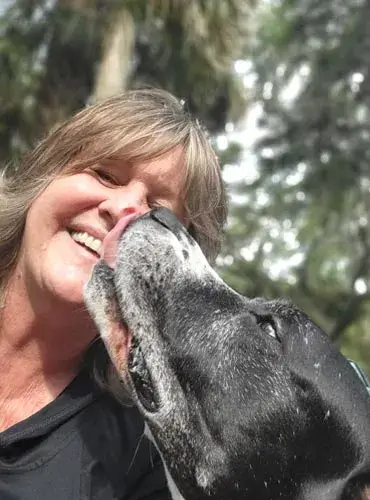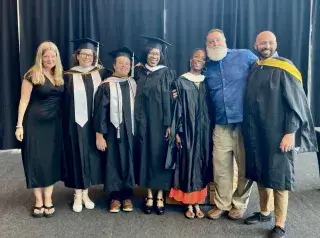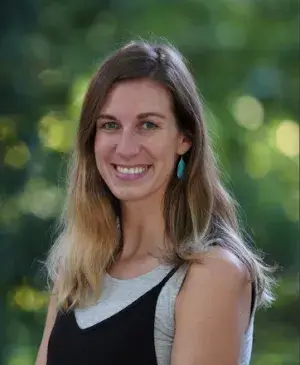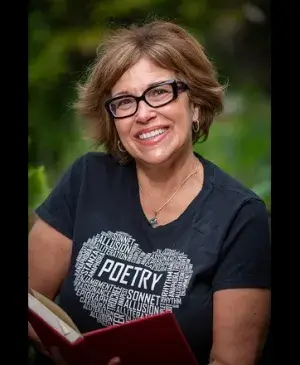

Why Earn Your Creative Writing Degree at Saint Leo University?
Whether your dream is to share your personal story as a memoir, to write a fantasy novel, or to create a lyrical collection of poetry, our low-residency Master of Arts in Creative Writing program can take your creativity and professionalism to the next level within a supportive community of peers and mentors.
Our low-residency format provides extreme flexibility for working adults, active-duty military members, veterans, and parents, meaning that you can pursue your writing goals online without interrupting your existing commitments to career, community, and family. You’ll spend one week each summer in an intensive residency, located at our beautiful university campus here in Saint Leo, Florida. Because the residency is scheduled to minimize its impact on student lives by beginning and ending on the weekend, it’s possible to enroll in our graduate program and spend just five business days away from home each year. You’ll then return home energized and inspired to work on your own creative project and enroll in semester online courses taught by members of our core faculty, all of whom are published writers of national reputation.
Designed to be completed in just two calendar years, this 36-hour master’s degree requires three summer residencies, four semesters of study, and a book-length thesis of the student’s creative work.
- The 2026 summer residency will be held from Monday July 6th to Saturday July 11th on University Campus.
View the 2025 Summer Residency Schedule
- The Saint Leo MA offers an affordable way for apprentice writers to explore and enhance their creative lives and to become part of a vibrant literary community.
The Master's of Art in Creative Writing is an advanced program that offers genre specializations in Poetry, Fiction, and Nonfiction.
Jump to
Take the Next Step
Contact the Admissions Team Submit Your Application Pay for the January Mini-ResidencyMaster's in Creative Writing Program Details
Our MA program’s online courses blend writing and literary studies with an emphasis on individualized instruction according to your genre (poetry, fiction, or nonfiction). Semester study plans not only provide structure and accountability but also are self-paced and flexible enough to accommodate a full-time job and other daily responsibilities.
Learn your way at Saint Leo University with flexible options—online, on-campus, or at an education center. Each program has its own modality to fit your needs. Whichever option you choose, Saint Leo University is committed to your success. View the details below to see how this degree program is offered.
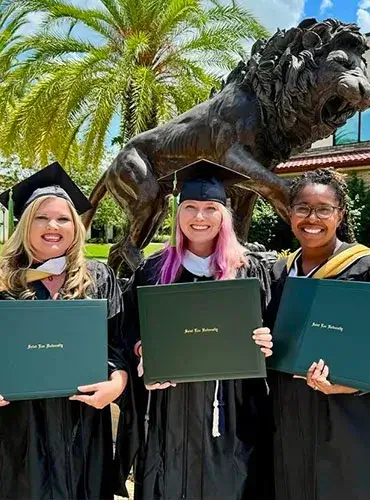
Convenient Online Learning, Empowering Your Future
Saint Leo University provides flexible and convenient online programs designed for busy students. Courses are taught by experienced faculty with real-world expertise. Students can access coursework anytime while balancing personal and professional commitments. Support services, career resources, and virtual engagement opportunities ensure a well-rounded online learning experience.
Discover Online LearningHow the Creative Writing Program Works
The program begins with a one-week annual summer residency, held on the beautiful Saint Leo University Campus, located north of Tampa. The residency is designed as an immersive and contemplative retreat. Each day includes a workshop where a faculty mentor leads small groups of students in discussing their own creative work. The rest of each day allows for bonding time with peers and mentors as well as discussions and activities led by a faculty member, a distinguished visiting writer, or a professional in the writing field, such as an editor or publisher. Past visiting writers have included Benjamin Busch, Amina Gautier, Jesse Goolsby, Beth Ann Fennelly, Allison Joseph, David Kirby, Adam Johnson, and Aimee Nezhukumatahil. We conclude each day with readings by faculty members or visiting writers, which are free events that are open to the public. Students also get the chance to share and celebrate their own writing-in-progress with each other during informal open mics. You’ll return home energized and inspired to tackle your coursework and that dream project.
-
During the fall and spring semesters, students complete coursework from home, communicating with peers and faculty mentors online. In a writing workshop course, each student creates and refines original work in fiction, poetry, or nonfiction. Each workshop is paired with a foundations course, where students read both contemporary and classic examples of writing in their chosen genre of study. In their third and final summer, students work on compiling, revising, and editing their creative work into a master’s thesis: a novel or short story collection, a memoir or essay collection, or a poetry collection, all of publishable quality.
-
![Creative Writing]()
Students Can Expect To:
- Produce a substantial, revised body of original creative work
- Thoughtfully engage with the workshop process of peer critique
- Demonstrate an understanding of various forms and structures of fiction, nonfiction, or poetry
- Critically analyze literature, making connections among texts, authors, and historical periods of the works
- Closely read and demonstrate an understanding of the historical context, literary influences, and traditions of canonical and contemporary prose and poems
- Demonstrate knowledge of editing and revision techniques
- Generate original scholarship on the literary texts explored in this program
-
![Grads]()
-
Some of our MA students enter the program with no expectation of pursuing further advanced degrees or traditional academic careers. Some will already be immersed in careers that may or may not be linked to the creative arts. Some will wish to wholeheartedly pursue the writing life. No matter your end goal, you will receive plenty of professional development opportunities, industry knowledge from expert faculty mentors, and support from our community. All this together means that you will be ready for a successful writing career or continued studies upon graduation. Plus, our Career Services center on campus is always available to help connect you with a variety of experiential learning opportunities to fit your individual career goals.
Several of our MA students have pursued further graduate coursework in MFA programs in Creative Writing or MA programs in Literature. Others have gone on to teach English courses to undergraduates as adjunct instructors at community colleges or universities, including at Saint Leo.
How to Apply
This page covers everything you need to know in order to put together your best possible application to our program.
For most graduate programs in creative writing, including ours, the most important part of your application is a sample of your creative work. We base admission decisions primarily on a written sample of the prospective student’s creative work submitted in the genre the student intends to study. If you want to study fiction, you should send us a short story or a section of a novel. Poets should send poems; nonfiction writers should send their best narrative nonfiction.
We read applications on a rolling basis until June 15th every year. Once your file is complete, we try to make a decision on your application within one week. Our upcoming academic year begins on June 27th, 2025.
Supporting materials that accompany an application (including transcripts) are used to help consider the other positive attributes a student might contribute to the university and program communities respectively.
Visit Graduate Creative Writing Admissions
Advice on applying to the Saint Leo M.A. in Creative Writing
For the Writing Sample:
All writing samples should be a minimum of 10 pages, and a maximum of 25.
Your writing sample should be in the genre in which you hope to be admitted; once you have been admitted to the program, you’ll have a chance to explore other kinds of writing, but you should start in one genre. If you aren’t sure yet what your primary genre should be, make sure to mention this conflict in your personal statement.
We like to be able to read your work comfortably: all work should be in a 12 point font, such as Times New Roman, Garamond, or Cochin, etc., and prose manuscripts should be double-spaced. A minimum one-inch margin on all sides is necessary, too. Please don’t shrink the margins to fit more pages. A smaller number of good pages beats a greater number of average ones every time.
Proofread. Check your spelling. This is a graduate program taught by professors of English. In other words, the rules apply, and spelling counts!
We’re looking for potential implicit in the writing, even if that piece is unfinished. Your strategy should be to send work that best represents you as a writer.
Creative Writing Micro-Credential Option
This micro-credential allows enrichment seekers not currently enrolled in Saint Leo’s Creative Writing MA to participate in the program’s annual week-long Summer Residency alongside graduate students. Saint Leo Creative Writing MA alums, or alums of another Creative Writing MA/MFA program, Saint Leo employees with a passion for creative writing, and anyone else who holds a BA (in any subject) who loves to write and seeks a literary community are all welcome to participate in this opportunity.
Please visit Saint Leo University's Skills Academy to find out more and to register.
Meet Our Faculty
-
![Anne Contact]()
Dr. Anne Barngrover, Ph.D.
-
![Gianna Russo]()
Ms. Gianna Russo, M.A.
Adjunct Faculty
Vedran Husić, PhD
Adjunct Instructor

Vedran Husić was born in Bosnia and Herzegovina and raised in Germany and the United States. His debut short story collection, Basements and Other Museums (Black Lawrence Press, 2018), was a semifinalist for the 2019 PEN/Robert W. Bingham Prize. He is the recipient of two fiction fellowships from Provincetown's Fine Arts Works Center and a fiction fellowship from the National Endowment for the Arts. Excerpts from his recently completed memoir, For Those Truly Living, have appeared in Cincinnati Review, Copper Nickel, and AGNI. He currently teaches undergraduate and graduate students at Saint Leo University.
Brooke King, MFA
Adjunct Instructor
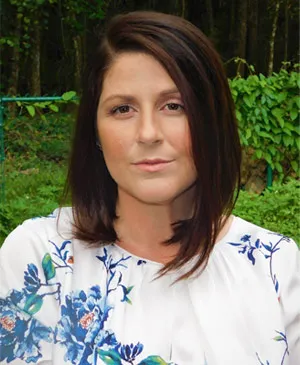
Brooke King served in the U.S. Army, deploying to Iraq in 2006 as a wheel vehicle mechanic, machine gunner, and recovery specialist. Her work has been published in the O-Dark-Thirty; War, Literature, & Arts; Prairie Schooner; and in the Hudson Whitman Excelsior Press Anthology Retire the Colors, among others. She has appeared as a featured veteran author on the KPBS literary series Incoming. Her memoir, War Flower: My Life after Iraq, has been heralded by Publishers Weekly as a “harrowing and powerful book [that] reveals the unique burdens borne by female veterans." Brooke currently works as a federal police officer and has recently completed her next memoir, titled Tales From the Dead.
Tony D'Souza, MFA
Adjunct Instructor
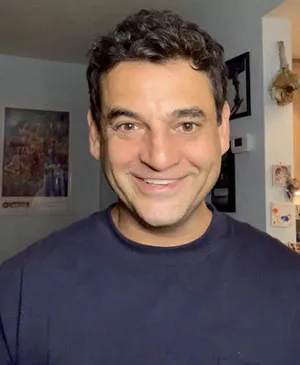
Tony D’Souza's first novel, Whiteman, 2006, was a New York Times Editor’s Pick, and won or was a finalist for many first novel awards, including from the American Academy of Arts and Letters, the New York Public Library, PEN, the LA Times, and won the Florida Gold Medal for Fiction. His subsequent novels were optioned for film, including by Warner Bros. Tony's major awards include a Guggenheim, an NEA, and the Japan-Friendship NEA. He recently ghost-wrote a memoir for Dr. Anna Kohen, whose family survived the Holocaust in Albania. Kohen’s book, Flower of Vlora, saw Dr. Kohen honored by the President of Albania, and will be used as a textbook in Albanian high schools. Tony and his family divide time between Sarasota, FL, and Mount Shasta, CA.
From the Creative Writing Faculty:
Our Master of Arts in Creative Writing program is supportive, warm, and affordable. Students range from recent college graduates to long-time working professionals: veterans and active-duty military members, teachers, stay-at-home parents, nurses, visual artists, retirees, and so on. Regardless of background, each student shares the desire to improve their writing and become part of a vibrant literary scene.
We pride ourselves on our personalized, detailed, caring feedback on your writing and the close literary relationships that we’ve built here at Saint Leo, and we hope that you will consider becoming a part of our community. Our admissions team stands ready to help you with the application process, and we as faculty would love to talk with you about your story, your writing goals, and how our program can help you achieve those goals. All you need to do is reach out.
Sincerely,
The MA in Creative Writing Faculty
Please contact Dr. Anne Barngrover, Program Director, at anne.barngrover@saintleo.edu with any questions you may have.
FAQs About the MA in Creative Writing Program
All admitted students begin our program by attending the one-week July residency. We accept applications on a rolling basis through June 15th each year.
Saint Leo’s low-residency degree is a family- and career-friendly option for graduate study. Instead of relocating to attend a full-time graduate program, you attend classes on campus for just one week annually in July. The remainder of your coursework is completed online from home.
Low-residency degrees are particularly attractive to students who have career, community, or family commitments that make quitting a job and relocating across the country impractical or even impossible. Many low-residency programs require two residencies per year; the Saint Leo MA requires just one, making it that much more accessible.
The 2025 summer residency will be held from Monday July 14th to Saturday July 19th on University Campus.
Each day is divided into several different sessions and goes from around 9:00 AM to 5:00 PM. Students attend a workshop of their peers where they provide feedback on each other’s in-progress fiction, poetry, or nonfiction. We eat lunch together as a community on campus. Our faculty and visiting writers lead lectures, craft talks, and discussions on topics ranging from writing techniques to publishing strategies, all with a focus on teaching you how to enter the world of professional writing. On some days you’ll attend readings by faculty mentors and distinguished visiting writers, and on others you’ll have the option to share your own work with each other at informal open mic events. We like to begin the week with a dinner out together in Tampa, and we end with a celebratory reading from our graduating students and a graduation ceremony and reception on campus.
Students who choose a low-residency program for graduate study do not come from any specific demographic. They range from recent college graduates who wish to continue their academic studies, to working professionals seeking to explore new career options, and to retirees pursuing the long-deferred dream of creative writing.
Our program is designed to be completed in just two calendar years. It requires 36 graduate credit hours of study. Students attend four semesters of study, plus three summer residencies.
We offer tracks of study in fiction, poetry, and nonfiction. Within each of those genres, the possibilities are endless. We do not favor any particular school of writing; we are excited by both literary and genre-specific styles (fantasy, sci-fi, mystery, YA, etc). No matter your genre or style, our main focus is to help you improve your writing through workshop and literature courses and personalized attention from core faculty members.
The ability to produce concise and thoughtful written work is a fundamental skill not just for fiction writers, essayists, and poets, but also for successful professionals in almost any field. This is in keeping with the mission of Saint Leo University, which fosters a student-centered environment in which the love of learning is of prime importance.
The reasons someone pursues a graduate degree in the arts are as varied as the students who seek those degrees. Our degree is aimed primarily at students who are approaching writing as a type of personal development, or those who are just beginning their exploration of the writing life. That means our community is one that offers mentorship and supportive critique, and provides models of the professional writing life in all its various forms, helping students build a base of skills in the study of both writing and literature.
The MA program at Saint Leo offers a broad approach to preparation for a possible writing career, requiring not only creative work but also the study of literature. These literature courses, called foundations courses, give an MA student a sense of both the historical and contemporary trends in their chosen genre of study. While the MFA has been considered a terminal degree in the past, many writers—especially those who wish to teach at the university level—elect to continue their studies through the doctoral degree.
Saint Leo is a national leader in providing educational options for students of all types. All our programs are designed to assist professionals in meeting challenging career goals, and to prepare them for the rapidly changing world in which they live and work. But there is no “typical” low-residency student; the community is necessarily diverse in age and background, but it is very much a community, bound together by a shared love of writing and support for each other’s creative endeavors.
As you explore your continuing education, costs need not be an obstacle. The Saint Leo MA is an affordable advanced degree, costing as much as fifty percent less than degrees at other institutions.
Financial aid programs are available and there are ways to help you finance your educational investments. It may be helpful to know that there are federal student loan programs for graduate and professional students. Graduate students may be eligible for up to $20,500 in Unsubsidized Direct Loans.
Applying for financial aid is easy! The only application you need is the Free Application for Federal Student Aid (FAFSA), which can be completed online at www.fafsa.ed.gov.
Alternate ways to finance your education:
- Employer assistance
- Military tuition assistance
- Veteran benefits (352) 588-7534 or (352) 588-8980
Pay for the January Mini-Residency:
Your education at Saint Leo University is an investment in your future, and the January Mini-Residency is no exception. To secure the top-tier payment option for this prestigious program, simply use the add to cart button provided below, and embark on a transformative journey at Saint Leo University.
(The Mini-Residency is free for current MA in Creative Writing students, MA in Creative Writing alumni, and current Saint Leo undergraduate students.)
Accreditation
Saint Leo University is accredited by the Southern Association of Colleges and Schools Commission on Colleges to award associate, bachelor’s, master’s, specialist, and doctoral degrees.
Student Stories
"What if, two years ago, I could have seen my future? What if that opportunity allowed a peek at who I'd become after completing Saint Leo's Creative Writing MA Program? What would I tell myself? Well, self—indubitably, you made the right choice! The tools in your writer’s toolbox were obtained from a team of well-versed faculty, like-minded peers, several residency programs, assignments, and academic reviews. Creative Writing MA graduate, you made the right choice."
Violetta Deloatch-Woods (Fiction, 2023)
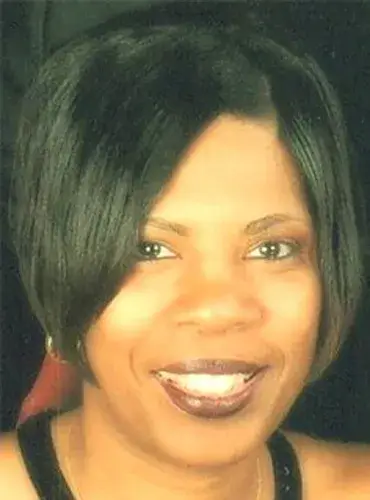
"Pursuing my MA at Saint Leo was the scariest decision I ever made; it also turned out to be one of the best. I have grown exponentially within this community of honest and talented writers, and I couldn’t have asked for better peers."
Derora Williams (Poetry, 2023)

"Saint Leo's Creative Writing MA program genuinely changed my life for the better. I learned so much about myself as a reader, writer, and human being with every assignment, and I was constantly challenged to grow outside of my comfort zone. My professors and peers were always there to celebrate achievements and overcome obstacles, making the program feel like my second family. I wouldn't be the person I am today without Saint Leo."
Emmett Ferree (Poetry, 2023)
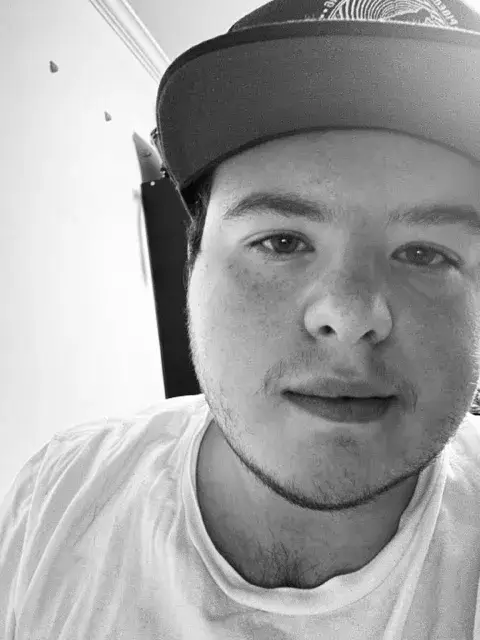
"Saint Leo's Creative Writing MA program helped me immensely as a reader and a writer. Learning to read not only what is in a story, but paying careful attention to how it's written, is just one of the memorable gifts I received from this program's helpful faculty and encouraging environment."
Janna Correa, (Fiction, 2022)
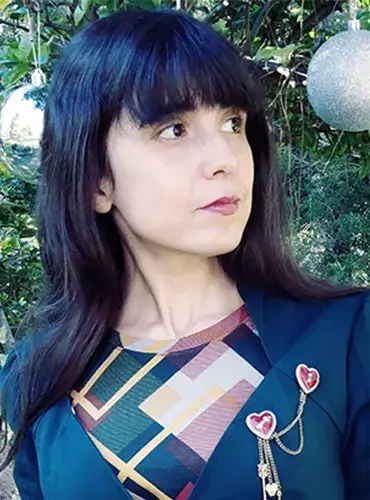
This program allows growth as a writer and as a person. The experience was absurdly personal. Absurd because of the organic evolution fostered by its leadership and absurd because of the personal touches from the instructors. Why expect that? St. Leo is invested in its students. You get more than you bargained for.
Jimmy Sutman, (Poetry, 2022)
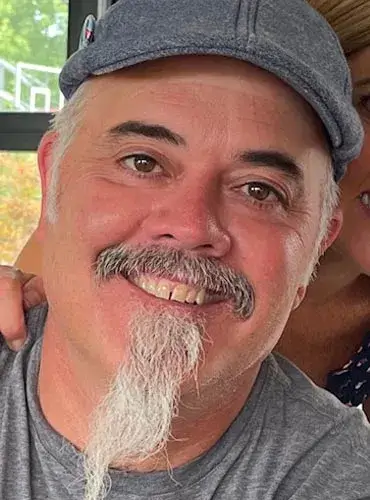
It can be intimidating to go back to school after decades of being in the workforce. But as a non-traditional student, I felt nothing but a warm welcome from Saint Leo faculty and my classmates. I started my first semester at another university and wasn't happy. I transferred to Saint Leo and learned more than I could have ever imagined in this program. Best decision I ever made. Thanks to my studies there, I'm getting ready to release my first book at the end of this year!
Lisa Moody, (Nonfiction, 2021)
